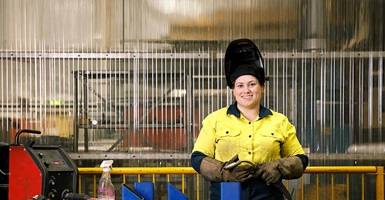Whether you’re just finishing high school or having a career change, choosing the right trade can be daunting.
One way to help you decide which trade career is right for you is to consider your natural skillsets and talents.
Here, we dive into some of the key skills that are needed for each trade.
Bricklayer
What does a bricklayer do?
Bricklayers lay bricks and other building blocks in mortar to construct and repair walls, arches and other structures.
Skills needed to be a bricklayer
Working as a bricklayer can be physically demanding, so you need to enjoy practical work and have an element of fitness, according to Chisholm Building and Construction Manager Adam Laxton.
Bricklayers generally work as part of a team with other construction professionals, so communication skills and being a team player also come in handy.
You should be willing to work at heights and outdoors, and have good hand-eye coordination.
How to become a bricklayer
Check out Chisholm’s Certificate III in Bricklaying/Blocklaying apprenticeship.
Builder
What does a builder do?
A builder oversees and runs construction projects, whether it be residential properties, commercial buildings or industrial sites.
Skills needed to be a builder
A desire to supervise and manage a project is a must, according to Adam. You need to be able to follow a project through from start to finish.
Good communication skills and teamwork are vital. You’ll be working with a wide variety of people (the client, councils and local authorities, architects and engineers, tradespeople, suppliers, etc.).
Attention to detail is important, as are leadership skills and problem-solving skills. You’ll need to ensure workplace safety regulations are followed, for example.
How to become a builder
To get started, browse Chisholm’s Building and Construction courses.
Building Design
What does a building designer do?
Building designers design and document residential and commercial buildings. Tasks can include everything from undertaking feasibility studies and sketching building plans to coordinating submissions to council and calculating labour costs.
Skills needed to be a building designer
Creativity is high on the list. The job involves producing working drawings of buildings and understanding various design concepts.
Good interpersonal skills and the ability to listen to what the client wants are also important. Tying in with this are written and oral communication skills.
Being tech savvy is also useful, though you’ll learn how to use software and virtual building technology as part of your studies.
How to become a building designer
See Chisholm’s Advanced Diploma of Building Design (Architectural).
Cabinet Maker
What does a cabinet maker do?
Cabinet makers are specialised woodworkers who make cabinetry, furniture and the internal infrastructure of buildings. This can range from kitchen and bathroom cabinetry to bespoke pieces of furniture.
Skills needed to be a cabinet maker
“A critical eye for detail is important in cabinet making, as a lot of the work is down to the millimetre,” says Adam.
“Being able to read some software packages is also important, as is creativity.”
You also need good hand-eye coordination and effective communication skills to excel as a cabinet maker.
How to become a cabinet maker
Check out Chisholm’s Certificate III in Cabinet Making apprenticeship.
Carpenter
What do carpenters do?
Carpenters (also known as a chippies) build and erect all sorts of timber and sometimes steel constructions, from building frames to installing flooring and external claddings in residential or commercial buildings.
Framing carpenters generally build the structures of a house and install exterior windows and doors. Finish carpenters focus more on the finer details in the interior like archives and skirting.
Skills needed to be a carpenter
Carpenters need an eye for detail so that they can identify structural errors or inconsistencies in the wood. They also need to be good with their hands
Carpenters often have to lift heavy pieces of timber, steel and different tools, so a certain level of fitness is required. You may also have to stand on your feet for long periods and at times work at heights.
Mathematics comes into play in carpentry for things like measuring volume and calculating dimensions.
How to become a carpenter
Chisholm’s Certificate III in Carpentry apprenticeship is a great place to start.
Electrician
What do electricians do?
Electricians or sparkies install, repair and maintain electrics, ensuring everything meets safety standards.
Skills needed to be an electrician
Electricians need to be fairly good at maths. Maths skills are useful for everything from determining the length of wiring to calculating wattage (and how to avoid overloading circuits and systems).
You also need a good technical mind and be keen to build your knowledge of electrical systems. Part of your job can involve reading wiring diagrams and floor plans, and applying electrical theory and laws.
There are risks involved in working with electricity, so you need to be vigilant about safety and show common sense.
How to become an electrician
Explore Chisholm’s electrical courses.
Welder (fabrication)
What does a welder do?
Welders work with metal goods using heat and various welding tools and equipment. Tasks range from mechanical and thermal cutting and fabrication to forming and shaping techniques, and general machining.
Skills needed to become a welder
Attention to detail is important in welding. Good welders need to pay attention to the little things, whether it be interpreting technical drawings and interacting with computing technology or remembering safety requirements when welding.
Being steady with your hands and having good hand-eye co-ordination are also useful. Welding can be highly technical, but with the right training you can master the skill.
Lastly, an element of physical strength is required, as you may need to lift heavy objects or stay in one position for an extended period of time.
How to become a welder
Check out Chisholm’s Certificate III in Engineering – Fabrication Trade apprenticeship.
Fitter and turner (mechanical)
What does a fitter and turner do?
A fitter and turner works from detailed technical specifications and uses specialised tools to construct, manufacture and assemble industrial parts and machine components. They may also repair or maintain machines as part of their job.
Skills needed to become a fitter and turner
To be a great fitter and turner, you need good hand-eye co-ordination. A lot of the job involves working with their hands.
You’ll also need to read and work off blueprints, plans and diagrams, so if you already have a flare for this, it will come in handy (although you’ll also learn it as part of your apprenticeship).
Patience and focus are also imperative. You could be working in a noisy manufacturing site, so you need to be able to tune into what you’re doing.
How to become a fitter and turner
See Chisholm’s Certificate III in Engineering – Mechanical Trade apprenticeship.
Plumber
What do plumbers do?
Plumbers install and repair pipes and fittings that carry liquids and gases. There are a variety of plumbing streams.
What skills do plumbers need?
Plumbers must have good hand-eye coordination and enjoy practical work. Manual dexterity and physical strength (to hold up things like pipework, appliances and toilets) are needed.
You must be able to work independently and apply problem-solving or troubleshooting skills. Some plumbing problems can be challenging!
Good interpersonal skills will also prove helpful. “You need to have that customer care,” says Chisholm Manager Plumbing and Safety Services Stephen Hammond.
How to become a plumber
Browse Chisholm’s plumbing courses.
Automotive Technician
What does an automotive technician do?
Automotive technicians do routine maintenance and repairs on everything from cars and trucks to boats and mobile plant technology.
Skills needed to become an automotive technician
Communication and basic English are crucial, according to Chisholm Automotive and Supply Chain Manager David Adams. “You need to be able to communicate the diagnosis with customers and complete repair orders,” he says.
“Basic maths is also required, as you may need to work out volumes, quantities and understand measurements.”
David says next on the list is fitness. “You don’t have to be a star athlete, but a physical ability helps (for things like bending down and getting under cars or lifting equipment).”
Lastly, an eye for detail, particularly around the diagnostics side of things, and a sense of curiosity about why something’s not working, are important.
How to become an automotive technician
See Chisholm’s automotive courses.
Landscaper
What do landscapers do?
Landscapers design, plan and maintain gardens and outdoor spaces. This can involve constructing brick and stone structures, retaining walls, landscape features and establishing plants.
Skills needed to become a landscaper
It goes without saying, but an interest in gardens and the natural environment is right up there.
Landscaping can be a physically demanding job, so a high degree of fitness is required. In terms of hard landscape skills, you may be laying drystone walls, pouring concrete slabs and building retaining walls with sleepers, for example.
Technical skills (which you’ll learn as part of your study), will also be important. You may need to understand things like soil and irrigation management, pest control, and weed management.
“For landscape companies employing a large number of people, teamwork may come in handy,” says Chisholm horticulture teacher Colin Bednarz. “In other businesses, it may just be the apprentice and the employer.”
How to become a landscaper
Check out Chisholm’ Certificate III in Landscape Construction apprenticeship.
Ready to take the next step?
If you’re still not sure which trade career is right for you, perhaps try taking this career quiz or check out this simulated work site.
Otherwise, talk to us. We can offer advice about choosing a trade career and possible study pathways (for example, with a pre-apprenticeship followed by an apprenticeship). Get in touch today.


